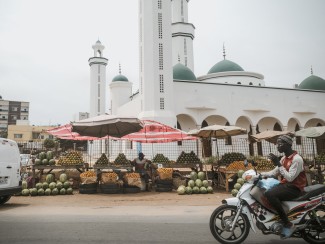New tech uses present challenges – and a host of opportunities – for the world’s poorest countries
1. More than half the globe is offline. In the Least Developed Countries (LDCs), only one in six people are connected.
It should go without saying that in order to buy and sell things online, people must have internet access. But that access is hampered for LDCs by factors from lack of infrastructure to geography to government readiness. Getting more people in LDCs online requires efforts at multiple levels and via multiple sectors. And this work, ranging from funding to logistics to policy, is a mighty task.
2. Ecommerce offers a solution to some of the development challenges LDCs face.
With 1.2 billion online shoppers in 2016, our giant world marketplace presents countless opportunities for people in the world's poorest countries – if the digital divide can be overcome. An ecommerce boost could mean much for country economies, and the possibility of greater outside investment.
Access to new markets and the potential for job creation and trade growth could increase people's earnings. And, there is a lot people in LDCs can do pending they have affordable connectivity, tools and training. In addition, certain barriers for women, youth and small businesses could be overcome, thereby levelling playing fields through increased inclusivity and incomes.
3. Supporting ecommerce in LDCs requires contextual understanding.
The world remains in the early days of buying and selling via the internet. Making progress with ecommerce in LDCs means understanding different country conditions and asking the right questions: Are there 3G networks? Is the country landlocked or an island nation? Are government policies in place to regulate commerce? Do citizens have access to education? Can people afford phones or computers? Is there a largely rural population?
The Enhanced Integrated Framework (EIF) in partnership with UNCTAD and LDCs develops what are termed Rapid eTrade Readiness Assessments of Least Developed Countries, analysis that offers needed insights into a country’s ability to engage in ecommerce and what is needed in order to do so. Specific recommendations are made related to policy, information and communications technologies (ICT) and trade logistics.
For example, the recent study of Nepal indicates that online consumers have grown from 8% to almost 60% over the last seven years as a result of improved infrastructure, with most shoppers having 2G or 3G mobile data services available to them. Some suggested improvements relate to the country's regulatory framework and epayment availability.
ETrade Readiness Assessments of Laos, Liberia and Myanmar will be launched at UNCTAD's eCommerce Week in Geneva from 16-20 April 2018.
4. Ecommerce will not solve every problem.
There is the risk that digitalization could widen existing divides, create new ones and result in job losses. Because of this, it is essential that ecommerce support in the LDCs is done with this in mind.
Following the assessment of Bhutan's eTrade readiness, the EIF is working with the government to put into practice some of the targeted recommendations, including creating an online commodity system that potato farmers are using to sell their harvests. Following this success, cardamom farmers are next in line, showing that some problems – in this case the lack of a stable market and knowledge of prices – can be solved through ecommerce.
5. Ecommerce is an ecosystem.
The combination of trade and the internet is its own ecosystem, with the interconnections complex and entangled in sometimes surprising ways. Developing and enhancing ecommerce in LDCs means making global and local connections, and requires partnerships, cooperation and coordination. Currently, more than 70% of the population in some developed countries are buying goods and services online, but for LDCs the figure is closer to 2%. Clearly, the ecosystem of trade on the internet is unbalanced with a lot of room to grow.
With government policies needing updates related to this rapidly changing sector, issues like movements across borders, data protection and ICT intersect and can be a challenge to address. And this is why partnerships and the sharing of knowledge are so integral. UNCTAD recently launched its E-Trade for all initiative, which offers key ecommerce funding information and works to connect LDCs to supportive institutions, including governments, the private sector and foundations. The Government of Rwanda has partnered with the private sector to build a 4G wireless network to cover 95% of the country. Examples like this, and other innovative partnerships both local and global, are setting the stage for online marketplaces to work effectively and improve LDC citizens' lives and incomes.
See this story in video form here.
If you would like to reuse any material published here, please let us know by sending an email to EIF Communications: eifcommunications@wto.org.


